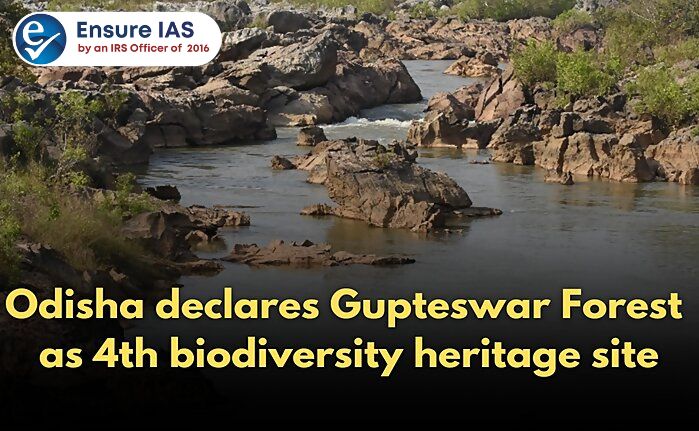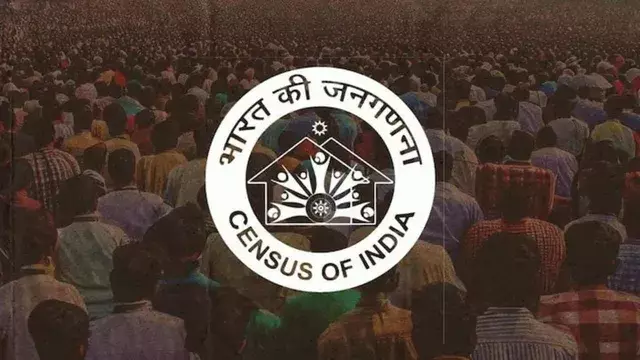- Courses
- GS Full Course 1 Year
- GS Full Course 2 Year
- GS Full Course 3 Year
- GS Full Course Till Selection
- Answer Alpha: Mains 2025 Mentorship
- MEP (Mains Enrichment Programme) Data, Facts
- Essay Target – 150+ Marks
- Online Program
- GS Recorded Course
- Polity
- Geography
- Economy
- Ancient, Medieval and Art & Culture AMAC
- Modern India, Post Independence & World History
- Environment
- Governance
- Science & Technology
- International Relations and Internal Security
- Disaster Management
- Ethics
- NCERT Current Affairs
- Indian Society and Social Issue
- NCERT- Science and Technology
- NCERT - Geography
- NCERT - Ancient History
- NCERT- World History
- NCERT Modern History
- CSAT
- 5 LAYERED ARJUNA Mentorship
- Public Administration Optional
- ABOUT US
- OUR TOPPERS
- TEST SERIES
- FREE STUDY MATERIAL
- VIDEOS
- CONTACT US
GUPTESWAR FOREST AS BIODIVERSITY HERITAGE SITE
GUPTESWAR FOREST AS BIODIVERSITY HERITAGE SITE
19-03-2024
- According to a recent government notification, the ancient Gupteshwar Forest adjacent to the Gupteshwar Shiva Temple in Odisha's Koraput district has been declared the 4th Biodiversity-Heritage Site (BHS) of the state.
- This site is spread over a demarcated area of 350 hectares.
- Odisha now has 4 BHS with prior declaration of biodiversity-rich areas like Mandsaru, Mahendragiri, and Gandhamardan.

What is Biodiversity-Heritage Sites (BHS)
- Under Section 37 of India's Biological Diversity Act 2002, state governments, in consultation with local governing bodies, can designate unique and fragile ecosystems as Biodiversity Heritage Sites (BHS).
- National Biodiversity Authority (NBA) advices the State Government in the selection and management of heritage sites under section 37.
- NBA is an Autonomous and Statutory Body of MoEFCC. NBA (Headquartered in Chennai) was established in 2003 by Central Government to implement India’s Biological Diversity Act, 2002.
- As per National Biodiversity Authority (NBA), India has a total of 45 BHS as of February 2024.
- BHS can be terrestrial, coastal, inland waters, or marine areas that exhibit rich biodiversity, including:
- abundance of wild and domesticated species
- high endemism
- rare and endangered species
- keystone or evolutionarily important species
- wild ancestors of cultivated varieties
- fossil beds reflect past biological importance
- significant cultural, ethical, or aesthetic values
- In some cases, BHS retain a long history of human habitation as well as cultural diversity
Biodiversity of Gupteswar Forest
- The biodiversity inventory and survey conducted by the Odisha Biodiversity Board shows the presence of rich flora and fauna in the area.
-
This includes at least 608 faunal species such as:
- 28 mammal species
- 188 bird species
- 18 amphibian species
- 48 reptile species
- 45 fish species
- 141 butterfly species
-
Significant faunal species documented here include:
- Mugger crocodile
- Kanger Valley rock gecko
- Sacred grove bush frog
- Black baza
- Jerdon's baza
- Malabar trogon
- White-bellied woodpecker
- The limestone caves of Gupteshwar provide shelter to 8 of the total 16 bat species found in southern Odisha.
- Two species - Hipposideros galeritus and Rhinolophus rouxii - are classified as near-threatened.
-
The site has abundant floral diversity as well with:
- 182 tree species
- 76 shrub species
- 177 herb species
- 69 climber species
- 14 orchid species and
- threatened medicinal plants
- Many agriculturally and industrially important microorganisms also exist in this ecosystem
Conservation and Development
- Declaring Gupteshwar as a Biodiversity Heritage Site (BHS) will promote the conservation of biodiversity and strengthen the cultural ties of local communities.
- The Government of Odisha has allocated Rs 35 lakh for the preparation of a conservation action plan and community awareness activities.
- Eco-tourism and non-timber forest products can support local livelihoods.
Must Check: Best IAS Coaching In Delhi



